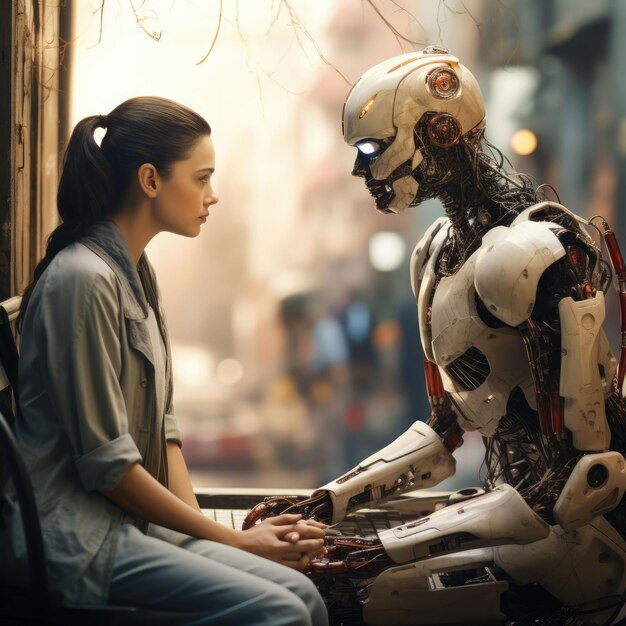The Future of AI Robots: A New Era of Productivity and Efficiency
Artificial Intelligence (AI) robots have been a topic of fascination and debate for several decades. From
science fiction
to
reality
, AI robots have come a long way. Today, they are not just a figment of our imagination but an integral part of our
industrial landscape
. With the continued advancements in technology, AI robots are poised to revolutionize the way we produce and consume goods and services.
Productivity
One of the most significant benefits of AI robots is their ability to increase productivity. They can work tirelessly for long hours without getting tired or requiring breaks. AI robots can perform repetitive tasks with precision and accuracy, freeing up human workers to focus on more complex tasks that require creativity and problem-solving skills.
Efficiency
Another advantage of AI robots is their efficiency. They can process large amounts of data in a short amount of time, making them ideal for tasks that involve complex calculations or analysis. AI robots can also learn from their mistakes and improve their performance over time, making them more productive and efficient as they gain experience.
Impact on Industries
The impact of AI robots is already being felt in various industries. In
manufacturing
, AI robots are used for assembly line tasks, quality control, and maintenance. In
logistics and transportation
, they are used for warehousing, order fulfillment, and delivery. In
healthcare
, AI robots are used for surgery, patient monitoring, and drug discovery. The possibilities are endless, and the future of AI robots looks bright.
Challenges and Concerns
Despite the benefits, there are also challenges and concerns associated with AI robots. One of the primary concerns is job displacement. As AI robots become more capable, there is a risk that they will replace human workers. However, it’s important to note that AI robots are not intended to replace humans but rather augment their capabilities and improve their productivity. Another concern is security. As AI robots become more intelligent, there is a risk that they could be hacked or used for malicious purposes. It’s essential to ensure that appropriate security measures are in place to address these concerns.
Conclusion
In conclusion, AI robots represent a new era of productivity and efficiency in various industries. They offer numerous benefits, including increased productivity, improved accuracy, and enhanced capabilities. However, there are also challenges and concerns that need to be addressed. By working together to address these challenges and leveraging the benefits of AI robots, we can create a future where humans and robots work in harmony to achieve greater productivity, efficiency, and innovation.

The Future of AI Robots: Economic, Social, and Ethical Implications
Artificial Intelligence (AI) and Robotics are two rapidly evolving technologies that have been transforming various industries and aspects of our daily lives. AI, also known as machine intelligence, refers to the ability of a computer system or machine to perform tasks that normally require human intelligence. It encompasses various subfields such as machine learning, neural networks, natural language processing, and computer vision. The history of AI can be traced back to the mid-20th century when Alan Turing proposed the famous “Turing Test.” Today, AI is being applied in various domains including healthcare, finance, education, transportation, and entertainment.
Robotics, on the other hand, deals with the design, construction, operation, and use of robots. Robots can be defined as programmable machines that can perform tasks autonomously or semi-autonomously. The history of robotics dates back to ancient Greece, but the modern era began in the late 19th and early 20th centuries with the invention of industrial robots. Today, robotics is being used in manufacturing, agriculture, healthcare, space exploration, and many other fields.
Importance of Discussing the Future of AI Robots
As AI and robotics continue to advance, it is essential to discuss their future implications, particularly in the areas of economy, society, and ethics. Economically, AI and robotics are expected to bring significant productivity gains, automate repetitive and mundane tasks, and create new industries and jobs. However, they may also lead to job displacement, particularly in sectors with a large labor force.
Social Implications
Socially, AI and robotics are raising concerns about privacy, security, and human-machine interaction. As machines become more intelligent and autonomous, they may be able to collect and analyze vast amounts of personal data, potentially leading to invasion of privacy and security breaches. Furthermore, as machines become more human-like in their interaction, they may raise questions about human dignity and social norms.
Ethical Considerations
Ethically, AI and robotics are raising complex questions about morality, values, and the role of humans in a world dominated by intelligent machines. For example, how should machines be programmed to make moral decisions? Should they be allowed to make decisions that harm humans, but benefit society as a whole? Furthermore, as machines become more intelligent and autonomous, they may raise questions about human responsibility and accountability.
